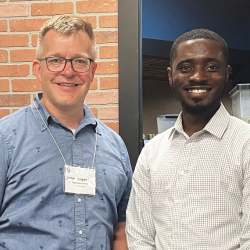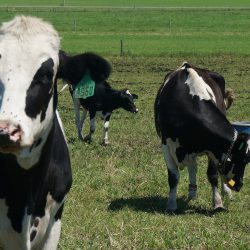Gloria Daniel-Igwe is a Nigerian PhD student and veterinary pathologist who is determined to impact her home continent through her research. In late December 2022, she arrived at the MSU College of Veterinary Medicine to study a parasite responsible for a deadly infectious disease.
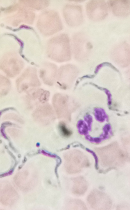
Back home, Daniel-Igwe is a veterinary pathology lecturer at Michael Okpara University of Agriculture Umudike (MOUAU) in Abia, Nigeria. She is also a scientist—her focus is hematology, the study of blood and blood disorders, and bone marrow responses to infection. Specifically, Daniel-Igwe is studying the hematology and ultrastructural pathology of organs and bone marrow that are responsible for creating immune cells in rabbits infected with Trypanosoma congolense, a parasite from the Trypanosoma family which includes strains that cause African Sleeping Sickness in humans.
Investigating T. Congolense
To MSU, Daniel-Igwe brought the past research on parasitic trypanosomiasis conducted by her primary investigator (PI), Professor V. O. Anosa, at MOUAU. He discovered that during Trypanosoma infections, some blood cells were engulfed by macrophages, a type of white blood cell. This is an immune response that treats healthy, friendly blood cells as foreign or diseased, and attacks them for no apparent reason. An attack on healthy cells by the body’s immune system is what causes the signature low blood cell count, called hemolytic anemia, during Trypanosoma infections.
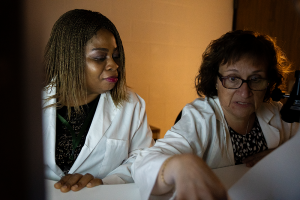
Daniel-Igwe means to take Anosa’s findings one step further and discover what causes macrophages to ingest blood cells. She hypothesizes that during infection, otherwise normal-looking blood cells may be coated with a molecule from the Trypanosoma congolense parasite. Daniel-Igwe thinks the molecule, known as an antigen, may be what attracts the macrophages to engulf the blood cells. Whether or not this coating exists impacts science’s understanding of how the infection functions—and it’s Daniel-Igwe’s case to crack.
“That’s what brought me to Michigan State University—to complete an aspect of my work which involves ultrastructural pathology and histochemical pathology, which we do not have at the level I need in my institution,” Daniel-Igwe explains.
Watch: The International PhD Student Experience
Today, Daniel-Igwe is back home polishing her work and defending her thesis. She speaks highly of her mentors and those she worked with at MSU. She says she was well-supported during her research.
“Dr. Dalen Agnew, my PI, is wonderful. He made my stay here very memorable. After I traveled all this way, I feel fulfilled. He follows up to see how I am doing in my work. If there are things I think I should discuss with him, he provides solutions and the information I need to do my studies.”
Continuing International Collaboration
The academic relationship between MSU and Nigerian students who study at the College has been ongoing. “We have had a strong connection with Nigeria for many years throughout MSU, but especially in the area of veterinary pathology. Each Nigerian student has recommended another one who could benefit from the resources we have at MSU CVM. Gloria Daniel-Igwe is the latest—but I hope not the last—Nigerian academic to train in our department. We look forward to a long collaboration,” says Agnew, professor and chair for the Department of Pathobiology and Diagnostic Investigation.
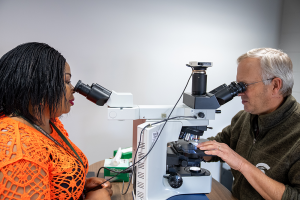
Daniel-Igwe’s work at MSU is a deeper study of a lesser-understood zoonotic disease. Cross-institutional, cross-continental collaboration is crucial to advancing knowledge on such infections. Daniel-Igwe’s work will likely continue in this vein, and what she’s learned at MSU will likely benefit her future investigations.
“I am excited to help her understand African Sleeping Sickness, which has not had the level of study that other diseases have had. Not only will her training using electron microscopy, immunohistochemistry, and computer-aided morphometry have an impact on her current project, but also the research she will continue to pursue for the rest of her career,” says Agnew.
What Comes Next?
Daniel-Igwe has her sights set on the future of her research after she completes her PhD. “I hope to continue my research work in infectious diseases and bone marrow—not just limited to parasitic infections—and also take my research further. If I have the opportunity to return for my postdoc, I wouldn’t mind gaining more experiences from MSU or any other place that is open for me to learn more and to make an impact with the knowledge I have!”

